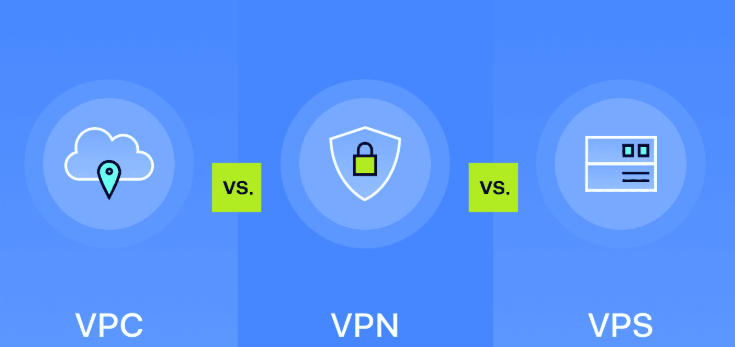
When comparing VPC vs VPN, it’s essential to understand how each creates private access to network resources. VPC and VPN are key to secure cloud access, but they work differently. A VPC is your own private space within the public cloud. A VPN is like a secure tunnel that lets you connect to that private space. This post explains the difference between them and how they work together to keep your cloud resources safe. Also, it highlights their differences and explains how they work together. Understanding VPCs and VPNs is crucial for any business moving to the cloud.
| Feature | VPN (Virtual Private Network) | VPC (Virtual Private Cloud) |
|---|---|---|
| Definition | Encrypts internet traffic to secure online activities. | Creates an isolated virtual network within a public cloud. |
| Use Cases | Secure remote access, Bypass geo-restrictions, Encrypt data on public networks | Hosting secure applications, Creating private cloud environments, Controlling access to cloud resources |
| Connection Type | Connects devices or networks across different locations via the internet. | Internal cloud networking for secure communication between cloud resources. |
| Security Level | Encrypts data transmission to protect against external threats. | Provides isolation from public users with strict access controls. |
| Deployment & Scalability | Used for securing remote user connections; limited scalability. | Cloud-based and highly scalable for hosting applications and managing resources. |
| Control & Customization | Minimal control over network infrastructure; mainly secures traffic. | Offers full control over network settings, access, and configurations. |
What is VPN?
VPN stands for Virtual Private Network. It allows you to create a secure and protected connection when you connect to the internet. VPNs completely encrypt your internet traffic and hide your identity. This makes it difficult for others to track your information and steal it. A VPN establishes a point-to-point connection between your device and the global Internet, allowing a user to access another computer from their PC using tunneling protocols.
WordPress Web Hosting
Starting From $3.99/Monthly
Key Features of VPN
- Encrypts your internet connection to protect your data from being tracked.
- Hides your real IP address to maintain privacy.
- Secures your data, even when using public Wi-Fi.
- Allows you to bypass restrictions and access blocked websites securely.
VPN Use Cases
- Access blocked websites.
- Change geographical location to access unavailable content.
- Secure remote work access.
- Encrypt online activities.
Challenges with VPN
- May reduce internet speed.
- Restrictions in some countries.
- Free versions offer limited features.
- Potential IP leaks if VPN disconnects.
What is VPC?
A Virtual Private Cloud (VPC) is a private network in the cloud that allows you to launch resources in a virtual network that you define. It offers isolation, flexibility, and control over your virtual network, including IP address ranges, subnets, route tables, and network gateways.
Key Features of VPC
- Provides a secure, isolated network environment in the cloud.
- Allows control over network configurations and access.
- Enables customizable resource management.
- Facilitates secure data transfer.
VPC Use Cases
- Hosting secure web applications.
- Setting up scalable databases and backend systems.
- Interconnecting cloud and on-premise networks securely.
- Isolating environments for development and production.
Challenges with VPC
- Complex setup and management.
- Higher costs compared to basic cloud services.
- Limited suitability for extremely large enterprises with internal infrastructure.
- Data security concerns due to off-premise hosting.
VPN vs VPC: Key Differences
- Definition: VPN provides encrypted communication between networks. VPC is an isolated network within the cloud.
- Use Cases: VPN is used for secure communication across networks. VPC is used for hosting and managing secure applications within the cloud.
- Connection Type: VPN connects geographically distributed networks. VPC supports internal communication within a public cloud.
- Security Level: VPNs encrypt data over the internet. VPCs provide security via network isolation and access control.
- Deployment & Scalability: VPNs are limited in scalability. VPCs are scalable and optimized for cloud environments.
- Control & Customization: VPNs offer limited control. VPCs provide extensive customization options.
When to Use VPN vs When to Use VPC
- Use VPN When:
- You need secure remote access for employees.
- You want to protect data over public networks.
- You need to connect multiple offices securely.
- You require secure access to cloud services.
- Use VPC When:
- You need a secure environment to host cloud-based apps.
- You want to manage network configurations with full control.
- You aim to create scalable and isolated cloud infrastructure.
- You require granular access policies.
Conclusion
VPN and VPC both play significant roles in cloud computing and cybersecurity. While VPNs are great for encrypted remote access and securing communications over the internet, VPCs are essential for building isolated, secure, and customizable environments in the cloud. Often, businesses use VPNs to securely connect to their VPCs, combining the best of both technologies for robust cloud architecture and security.

